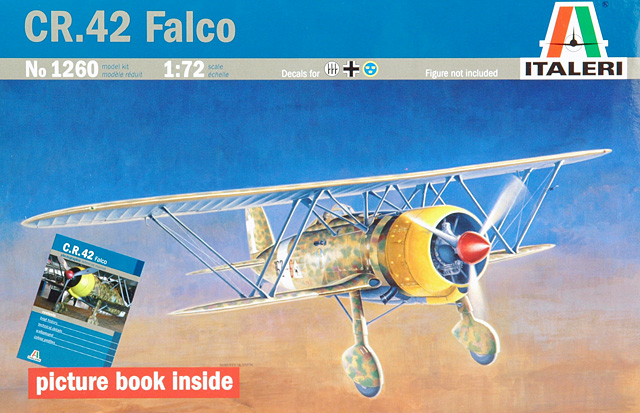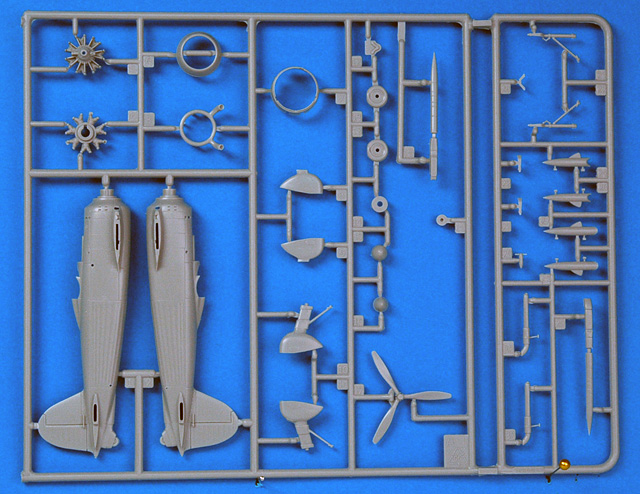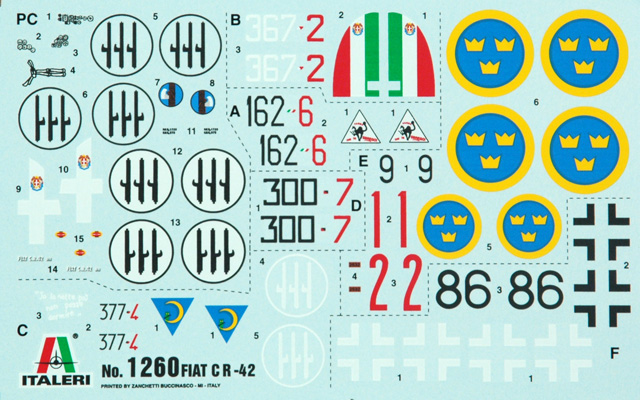|
Fiat CR.42 Falco
WW II Italian Biplane Fighter

Italeri, 1/72 scale
S u m m a r y
|
| Item No. |
Italeri No 1260 Fiat CR.42 Falco |
| Contents and Media: |
84 light grey plastic parts on two
sprues, 3 clear plastic parts on one sprue, decals for six aircraft, 11
page A5 sized instruction booklet with history, parts plan, 11 very
clear build diagrams and 3 pages of paint/decal drawings plus 48 page
bonus walkaround book. |
| Scale |
1/72 |
| Price: |
around £6.99
(available online from Hannants) |
| Review Type: |
FirstLook |
| Advantages: |
Highly detailed engine and cockpit,
many optional parts including three complete undercarriage versions,
cowl flaps open, big choice of markings and a bonus booklet that is
worth almost as much as the kit. |
| Disadvantages: |
Fitting the upper wing could be a
challenge, no rigging diagram many smaller parts may be fragile. |
| Recommendation: |
Highly Recommended |
Reviewed
by Glen Porter

Italeri's 1/72 scale Fiat CR.42 will be available online from Squadron.com
The Fiat CR.42 was considered to be one of the best and
fastest biplanes ever built. This was mainly due to the fact that the
Italian Air Force was a little bit slower than other air forces to adopt
the monoplane, retracting under-carriage and enclosed cockpit concept.
They considered that maneuverability was more important than speed and
therefore stuck with the biplane.
First flown in 1938, the Fiat CR.42 was still being
used, though not as a front-line fighter, well into 1944.
The recent Pavla kit of the same aircraft was quite good but being a
short-run multi-media offering meant that it would only be attractive to
the more experienced modellers. This one, by Italeri, is a mainstream
plastic kit and, although perhaps still not for the absolute novice
because it is a biplane, it should be able to be built by any one with a
small amount of experience.
While Italeri does some really good kits, we perhaps don't expect them
to have the level of detail of Dragon, the clean moulding of Hasegawa or
Academy or the parts fit of Tamiya. Apart from the parts fit (I can't
comment on that until I start putting it together), I think Italeri have
at least equaled, if not surpassed the others with this one. Like
Dragon, Italeri have never been afraid to mould some very small and fine
parts and this kit has plenty of those. However, it is not just
detail, but the kind of detail that modellers want like open cowl flaps,
realistic interior, engine and undercarriage.

Click the thumbnails below
to view larger images:
After lifting the flap of the end-opening box, the first
thing I noticed was that all the sprues are bagged with the clear sprue
in a separate one, an area where Italeri have previously been sadly
lagging behind the opposition.
The A sprue has 33 parts including fuselage halves,
two-piece engine, front cowling ring, exhaust ring, rear cowling
including open flaps, 3 different under-carriages, optional intakes,
prop and optional spinners. Sprue B has one-piece upper wing, 2
one-piece lower wing halves, two-piece tail-plane, multi-piece cockpit,
struts by the million, cowling engine covers, skis and bombs. All these
parts are beautifully moulded with engraved panel detail, no flash and
to scale where appropriate which means there are some very small bits
included. The fabric covered areas are perhaps a bit over-done. The
wings in particular could do with a quick rub with a fine sanding stick.
Decals, by Zanchetti Buccinasco of Milan, Italy, are beautifully done
with perfect register, good colour density and minimal carrier film but
they look a bit on the matt side. With markings for six aircraft and
national markings for three nationalities plus some stencils its a
pretty full sheet. There are four Italian CR.42s, three in the standard
three colour scheme, (sand with green and brown mottle with light
blue-grey under-sides), one with a yellow cowl, not in Belgium but
Rhodes, Greece, 1941, one with a black cowl, Ciampino, Italy, 1942, and
the third in the over-all three colour scheme, Cameri, Italy, 1939. The
fourth is in over-all black and is a night-fighter with the extended
exhausts in Italy, 1942. Next comes a Luftwaffe example from JG/107 with
unspatted under-carriage in green with sand mottle and light blue-grey
under-side, Nancy-Essay, France, 1944. The last marking example is a
Swedish aircraft in the three colour camouflage but over-painted in
white on the upper surfaces and on skis, Sweden, 1942.

The instructions, as we've come to expect from Italeri, have 11 very
clear build diagrams preceded by history and parts plan and followed by
3 pages of decal/paint guide. What I think may be a possible mistake in
the instructions is that they tell you to use the sand filter for all
aircraft except the night-fighter (C). I think it should be use the
standard filter for all aircraft except the Luftwaffe example (F). My
reasons for this are that all the aircraft shown in the instructions,
box back-side and Reference Manual show the sand filter on the Luftwaffe
CR.42 only. The reference manual has 4 extra side profiles which all
have the sand filter but there are no markings for these four in the
kit.
Ah, the reference manual. This is another highlight of the kit. It is a
48 page A5 sized book with four chapters. History is much more
comprehensive than in any kit I've ever seen. Technical details,
original diagrams from the Spare Parts Catalogue (12 pages) with
captions. Walkaround - 20 pages of very clear colour photos from a
restored example in the Museo Storico dell'Aeronautica Militare in Vigna
di valle, near Rome and last but not leased, Colour Profiles, 10 very
colourful profiles, 4 more than in the kit, just in case you want to do
something different. This is quite a coup for Italeri as it means that
modellers without the references don't have to go out and buy, beg,
borrow or steal them, just buy the kit. An interesting little note that
has come out of the Reference Manual, and I quote, “This publication is
an integral part of Italeri kits 1260 and 2653, and cannot be sold
separately.”
I wonder what kit number 2653 will be?
Highly Recommended.
Thanks to Italeri for the review sample
Review Copyright © 2006 by Glen Porter
This Page Created on 20 April, 2006
Last updated 20 April, 2006
Back to HyperScale
Main Page
Back to Reviews
Page
|
Home | What's
New | Features
| Gallery |
Reviews | Reference
| Forum
| Search